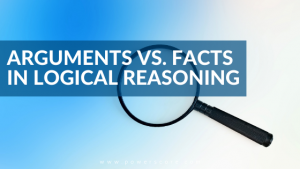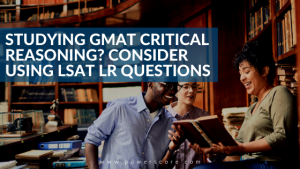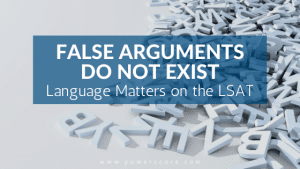If your LSAT is fast approaching, you're inevitably wondering how to best prioritize your study efforts. A good place to start is figuring out which Logical Reasoning question types to focus on. To that end, here's a dissection of released LSATs from June 2013 to June 2015. Let's see exactly what the test makers have emphasized and what they've relegated to a back shelf. After all, if you know what your fellow test takers have faced, your own … [Read more...]
Arguments vs. Facts in Logical Reasoning
Recognizing Argumentation One of the most important tasks facing test takers in the Logical Reasoning section is the ability to accurately identify the presence of argumentation. “Argumentation” can be summed up as an author’s attempt to persuade the reader to believe that the author’s opinion is correct. While that seems simple enough, it’s not always that easy to spot.Argumentation on the LSAT is often in shades of gray as far as degree or … [Read more...]
Timing is (Almost) Everything When it Comes to Logical Reasoning
Keeping a good pace on the Logical Reasoning section is primarily a function of one’s conceptual understanding of the test. By “conceptual understanding,” we mean that simply knowing how to approach the most frequently appearing question types won’t suffice. Rather, you should practice solving each question type with over and over until your approach becomes more intuitive than deliberate. Conceptual Understanding in Practice For instance, you … [Read more...]
A Causal Reasoning Smackdown
I recently had the great pleasure of teaching our free Causal Reasoning Secrets seminar, which is always a lot of fun. Getting into the spirit of things, I searched federal case law for opinions focusing on causal reasoning and found a doozy in Claar v. Burlington Northern R. Co., 29 F.3d 499 (C.A.9 (Mont.), 1994). Claar v. Burlington Northern R. Co. Twenty-seven employees brought a suit against the Burlington Northern Railroad Company. They … [Read more...]
Studying GMAT Critical Reasoning? Consider Using LSAT LR Questions
Those of you who follow the PowerScore blog know that I most frequently write about the LSAT and law school related topics. However, PowerScore also offers GMAT books, so I spend time in the GMAT world as well. If you've ever studied the GMAT, you know that both the Critical Reasoning (CR) and Reading Comprehension (RC) sections of that test are very similar to the LSAT Logical Reasoning (LR) and Reading Comprehension sections. But whereas the … [Read more...]
False Arguments Do Not Exist: Language Matters on the LSAT
At the beginning of each class we lay down the ground rules: raise your hand if you want to ask a question, turn off your smart phones, try to pay attention. In addition to that, students aren't allowed to call an argument "false," "wrong," or "stupid." Language matters.Here's why:In logic, we don't speak of arguments as being "true" or "false", nor do we speak of statements as being "valid" or "invalid." We assume that the premises upon … [Read more...]
The Fundamentals of Prephrasing Part II
If you’ve spent much time with Logical Reasoning on the LSAT, you’ve recognized that the answer choices, right and wrong, are masterfully crafted. The test makers are unbelievably adept at disguising correct answers, and making the incorrect options look extremely attractive. Fortunately there’s a step in the question-attack process designed specifically to help you navigate through the answers: Prephrasing. Recapping Part I Since we go over … [Read more...]
LSAT Test Composition: How and Why Difficulty Varies
Struggling with Consistency? One question that arises frequently is, “Why am I not consistent in how I score on a certain section?” For example, a student may see his or her score in Logical Reasoning move around by a few questions with each practice test. Or, a student with consistent overall scores notices that sometimes she performs well on Reading Comprehension, other times Logical Reasoning, and other times Games. So, she ends up scoring … [Read more...]
Logical Reasoning Traps: How to Avoid the Natural Question Error
I was recently asked about a specific question from the October 1999 LSAT (O99, LR1, #7) on our LSAT Discussion Forum. A summary of this question, known as Debbie's Magic Act, is as follows: Debbie has a magic act where she identifies a card chosen randomly from a deck, without ever looking at the card beforehand. A skeptic examined the process, and conducted three separate tests. In the first test, he made a video of her selecting the correct … [Read more...]
Assumption and Must Be True Questions: Strange Bedfellows
Must Be True Questions Must Be True (aka “Inference”) questions are foundational to both the Logical Reasoning and Reading Comprehension sections of the test. Most commonly, their question stem indicates that the information in the stimulus should be taken as true (“if the statements above are true…”). It then asks you to identify an answer choice that is proven or supported by it (“…which one of the following must also be true?”). All Must Be … [Read more...]
O.J. Simpson’s Bloody Gloves in the Context of the LSAT
The most memorable line from O.J. Simpson’s 1994-95 jury trial was defense attorney Johnnie Cochran’s genius phrase. "If it doesn’t fit, you must acquit." That clear, simple rule is widely thought to be a key factor in Simpson’s acquittal. In today’s post, we’re going to look at that statement and its circumstances in the context of the LSAT. Recapping the Case For those who don’t know, O.J. Simpson was an American football legend and a … [Read more...]
The Fundamentals of Prephrasing Part I
If you’ve spent much time with Logical Reasoning on the LSAT, you’ve recognized that the answer choices, right and wrong, are masterfully crafted. The test makers are unbelievably adept at disguising correct answers, and making the incorrect options look extremely attractive. Fortunately there’s a step in the question-attack process designed specifically to help you navigate through the answers: Prephrasing.Prephrasing is the intermediate … [Read more...]
Speaker Identifiers in Logical Reasoning
In a number of LSAT Logical Reasoning questions, the first thing you see is an identifier of the type of speaker making the argument that follows. For example, you might see “Archaeologist,” or “Researcher,” or "Expert,” to name three examples from a recent LSAT. Most students fly right by these speaker identifiers without further thought, but should they? Probably not, so let’s talk about why that is the case. Speaker Identifiers Do Not … [Read more...]
“Most Strongly Supports” vs. “Most Strongly Supported” in Logical Reasoning Questions
Let’s look at two LSAT logical reasoning question stems that sound awfully alike, but are anything but: "Which one of the following, if true, most strongly supports the argument above?"vs. "Which one of the following is most strongly supported by the information above?" In the first instance, your job is to assume that each answer choice represents a true statement, and then determine which one is most helpful to validating the conclusion … [Read more...]














